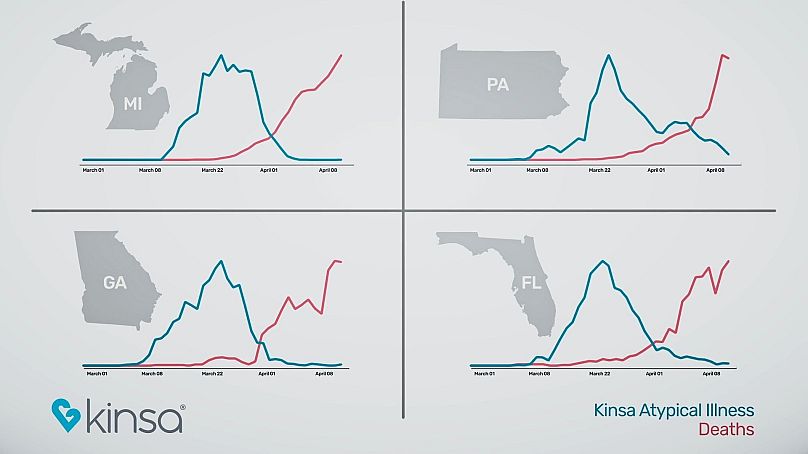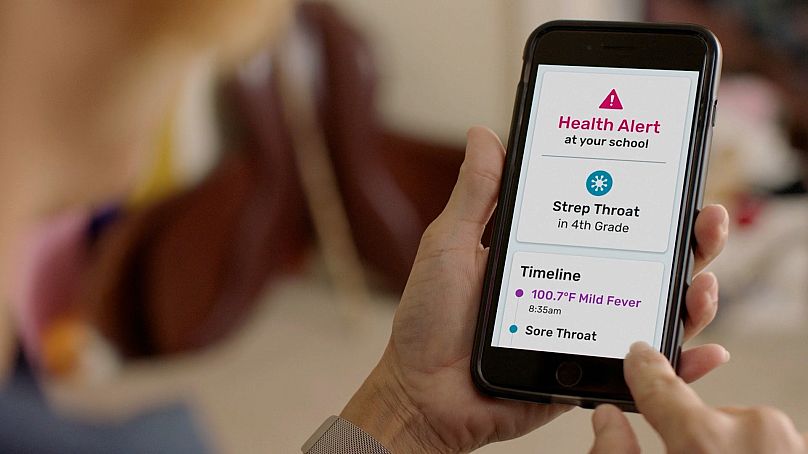“What we were seeing in March was an unusual outbreak everywhere, a complete black swan event,” Kinsa founder and CEO Indra Singh told Euronews.
As coronavirus ripped through the world last year one American company saw it happening in the United States almost three weeks before Covid-19 cases were officially announced.
 ADVERTISEMENT
ADVERTISEMENT
 ADVERTISEMENT
ADVERTISEMENT
For the last nine years, Kinsa Health has been tracking fevers from its network of millions of smart-phone-connected thermometers. The technology and early warning system could improve how we control infectious diseases before they spiral into pandemics.
During the onset of Covid-19 in March 2020, the company took their forecasts of body temperatures of previous years and subtracted the typical cold and flu numbers.
The results were surprising and worrisome.
“What we were seeing in March was an unusual outbreak everywhere, a complete black swan event,” Kinsa founder and CEO Indra Singh told Euronews.
"We were really worried that there was Covid-19 everywhere," he explained.
Kinsa reviewed the data showing hot spots lighting up in Texas and Florida. But Singh was told his results were not credible, because at that time coronavirus cases were only confirmed in Seattle and Santa Clara county in California.
But 18 days later, coronavirus cases were confirmed in Texas and Florida.
At the time Singh could tell that it was an unusual outbreak, but could not confirm it was Covid-19 until he had completed two month of further investigation.
Could smart thermometers prevent future pandemics?
Healthcare systems carried out the traditional measures to control the virus: widespread testing, treating and isolating and vaccinating.
But early warning should be the first step.
“By the time someone enters the health care system, by the time they see a doctor get a test, it's too late, they have already spread that illness,” said Singh.
But, he argues, if there was an early warning system we could have the opportunity to “get ahead and to contain outbreaks before they spread to the broader population”.
Kinsa is now using its data to help US efforts to contain coronavirus and its data is used by officials in five states and five cities, as well as by research groups.
To date, it has distributed around 2.4 million thermometers in the US. With prices starting at $24,99 (20,99 euros) it is an affordable product for many, and is also used by top athletes.
The National Basketball Association (NBA) uses Kinsa’s thermometers for its players and coaches to protect themselves from coronavirus.
The company is trying to expand its network and will be available in the United Kingdom this summer, and in other European countries within the next year.
Rolling out the smart thermometers to poor communities is the priority, Singh said, as they do not have access to health care.
One in four of Kinsa’s products are given away for free to the underserved, something he says will help the company to identify the epidemic early. In 2013, Kinsa launched its FLUency Program, which was initially to help schools combat the seasonal flu. The company relies on government grants and donations to get the smart thermometers to underprivileged communities for free. It is now used in 5% of US primary schools.
More than a thermometer
Kinsa’s product does not just take your temperature. The app asks you a series of questions about your symptoms and can help make your decision if you should see a doctor, seek emergency aid or stay at home.
“Kids get sick so frequently and I know that the first thing that occurs in parents' minds is the 'what's going around?' question,” said Singh.
“And if I know that what's going around is something more severe, if it's flu versus the common cold, well, I'm like more likely to go and stay home, treat them, get them to the doctor.”
Telemedicine is here to stay
Managing and tracking our health through technology has accelerated due to the coronavirus pandemic, as access to care has become more complicated due to restrictions.
"Telemedicine was a big trend even before a pandemic but the way Covid-19 has impacted the adoption of digital health technologies is that it's creating a new a new norm,” say Bartalan Meskó, the expert who brands himself The Medical Futurist.
With technology like Kinsa's as well as other companies such as Withings launching smartwatches that can measure your blood oxygen levels and even record an electrocardiogramme at the touch of a button, it has become easier to manage our health.
But while digitisation allows us to better understand our bodies, the key is sharing that information with the experts.
“In the way we have to become experts about our own lifestyle or health and disease management, but not to diagnose ourselves alone, but to share that data with a partner physician with their expertise in medicine and health care,” Mesko said.
“We together as a medical team, we can get to the best medical decisions for my medical issues.”
The question now is whether this pandemic is the moment to make the cultural shift in healthcare needed to take advantage of the technological revolution that digitisation and digitalisation can offer.












